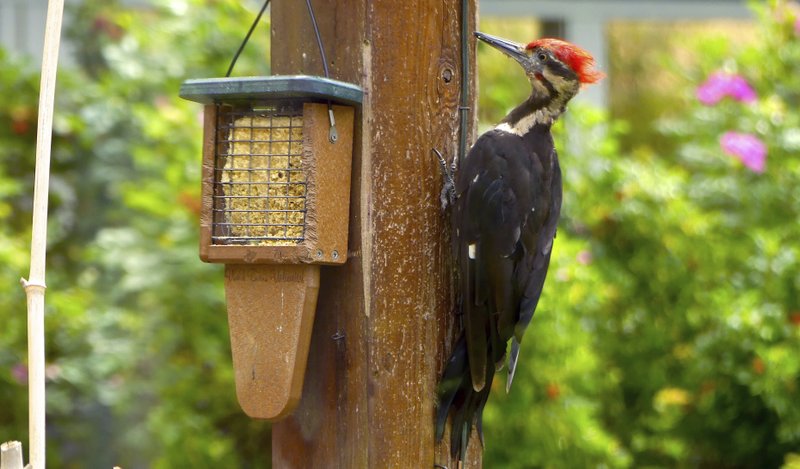Woodpeckers, flickers and sapsuckers may be fun for birders to watch but they can be troublesome — pecking holes in dwellings, shredding feeders, enlarging cavities in trees, and driving you to distraction by drumming on wooden or metal surfaces.
"Woodpeckers can damage houses, especially those with cedar siding, or those that are painted brown, making them look like a giant tree trunk," said Clifford Shackelford, Texas Parks and Wildlife Department ornithologist. "These conditions also attract carpenter bees, which bore holes in order to lay their eggs."
Woodpeckers hammer or peck on wood or metal for three reasons, Shackelford said. First is foraging or seeking food. Second is drumming, when a male during the extensive spring mating season lays claim to a territory by tapping on wood or metal. And third is excavating for a place to build a nest and rear young.
What's a harried homeowner to do?
"Since all species of woodpeckers are protected by state and local laws across the United States, lethal solutions or killing these birds is not an option," Shackelford said.
That leaves benign solutions. Several to consider:
• Woodpeckers need trees for shelter and food. Redirect them to different wooded locations. Place bird feeders at distant sites, leave snags (dead branches or standing trees) on the property, build large nesting or roosting boxes, repair and cover damaged areas of the house or, if all else fails, try a pest control service.
• Frighten or scare. These bird-proofing options include displaying predator decoys, hanging reflective or colorful items, creating loud noises, or introducing odor or flavor repellents.
Predator-like decoys can lessen the degree of woodpecker damage but won't discourage the birds for long, said Marvin Reynolds, an area director for Colorado State University Extension.
"They can become used to owls, hawks or snakes in an area," Reynolds said. "If the predator doesn't move, they will realize it's not a threat."
Stuffing insulation into woodpecker-carved cavities also is a short-term stopgap since the birds simply will remove it, he said.
Pepper sprays are only a temporary fix and need to be reapplied after it rains or snows.
"Hanging an old CD or DVD that can spin in the wind seems a good deterrent," Reynolds said. "Foil strips work the same way."

The sun's reflection from a mirror also will scare birds, he said.
Here's what not to do:
• Don't trap, capture, injure or kill woodpeckers. Do not remove eggs from their nests.
• Refrain from using sticky substances that could be toxic or coat the birds' feathers. Those also could stain furniture and buildings.
• Do not use insecticides to try to eliminate woodpecker food sources. They have many adverse effects, including thinning already scarce pollinator populations.
It's not true that woodpeckers, flickers and sapsuckers kill trees, Shackelford said.
"It's guilt by association because woodpeckers are observed foraging on dead or dying trees that are swarming with hidden insects, namely beetle larvae under the bark or deep inside the wood, that serve as woodpecker food," he said. "Actually, woodpeckers are beneficial because they can help keep numbers of these sorts of insects in check."
HomeStyle on 02/09/2019
